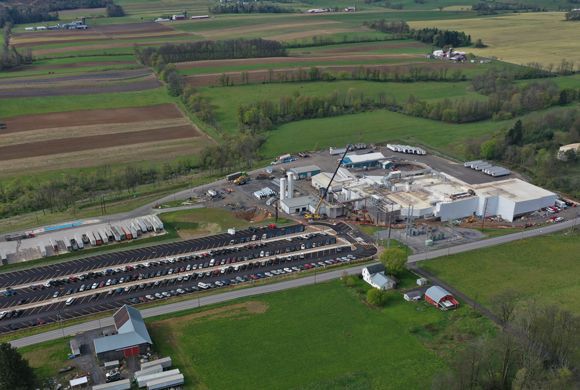The engineer who authored Pennsylvania Department of Environmental Protection’s guidance on properly managing food processing waste called on the department during a recent news conference to walk back its enforcement action that effectively shuttered a Clinton County beef processing plant.
Loganton-based Nicholas Meat temporarily closed Feb. 23 after a DEP compliance order prohibiting the company from land-applying food processing residuals (or FPR) on snow-covered ground left it without a viable option for managing the waste generated by daily activities.
Dr. Robin C. Brandt, the principal author of DEP’s guidance manual on managing FPR, joined local farmers and representatives from Nicholas Meat for a Feb. 24 news conference calling for DEP to rescind its compliance order.
“This compliance order represents a change in standing policy that DEP has followed for many years,” Brandt said, noting that Nicholas Meat uses technology that injects FPR under snow cover. “It seems to me that it’s time to take another look at the modern practices being used by Nicholas Meat and allow them to reopen their doors.”
Pennsylvania Farm Bureau has been engaged on the issue, warning that sudden closure of the plant would disrupt the food supply chain and leave farmers without a market for their products. Two Farm Bureau members, State Board Director John Painter II and Clinton County Farm Bureau President Justin Snook, spoke at the news conference.
“Pennsylvania Farm Bureau is hopeful that the Department of Environmental Protection will work together with Nicholas Meat to reach a solution that allows meat processing to continue, protects the environment, and restores a critical market for livestock farmers in northern and central Pennsylvania,” Pennsylvania Farm Bureau President Rick Ebert said. “We saw early in the COVID-19 pandemic the havoc that sudden halts in food processing can wreak on the food supply chain. Farmers make reservations for processing months in advance and interruptions to those plans leave farmers without a market for their livestock. This not only hurts farmers financially but affects the supply of food available to consumers.”
DEP had previously allowed Nicholas Meat to land apply FPR in winter but reversed course recently, telling the company it could no longer apply on snow-covered ground. The company said it has expanded its facilities for storing FPR but those facilities are not unlimited and the plant cannot operate without the ability to land apply.
Brandt noted that when the FPR management manual was first created, it recommended against applying over snow. However, technology—which Nicholas Meat uses—has developed since then that allows the FPR to be applied under the snow, preventing runoff.
“We know better how to land apply in winter situations,” he said. “New technology allows it to be land applied in an environmentally safe manner.”
Painter, who sends cattle from his Tioga County farm to Nicholas Meat, said the closure leaves him without an accessible market for his organic beef. The next closest processors that handle organic beef are hours away and appointments need to be made well in advance. And he said, other processors are already at capacity and will not be able to take on a sudden influx of market-ready cattle.
“It’s going to have a major impact if [Nicholas Meat is] shut down very long,” Painter said. “The supply chain is already full. We tested that during COVID.”
Snook noted that Nicholas Meat is an important outlet for local farmers to send their livestock rather than having to go through a sale barn.
“It’s certainly going to lead to depressed local prices,” he said.

